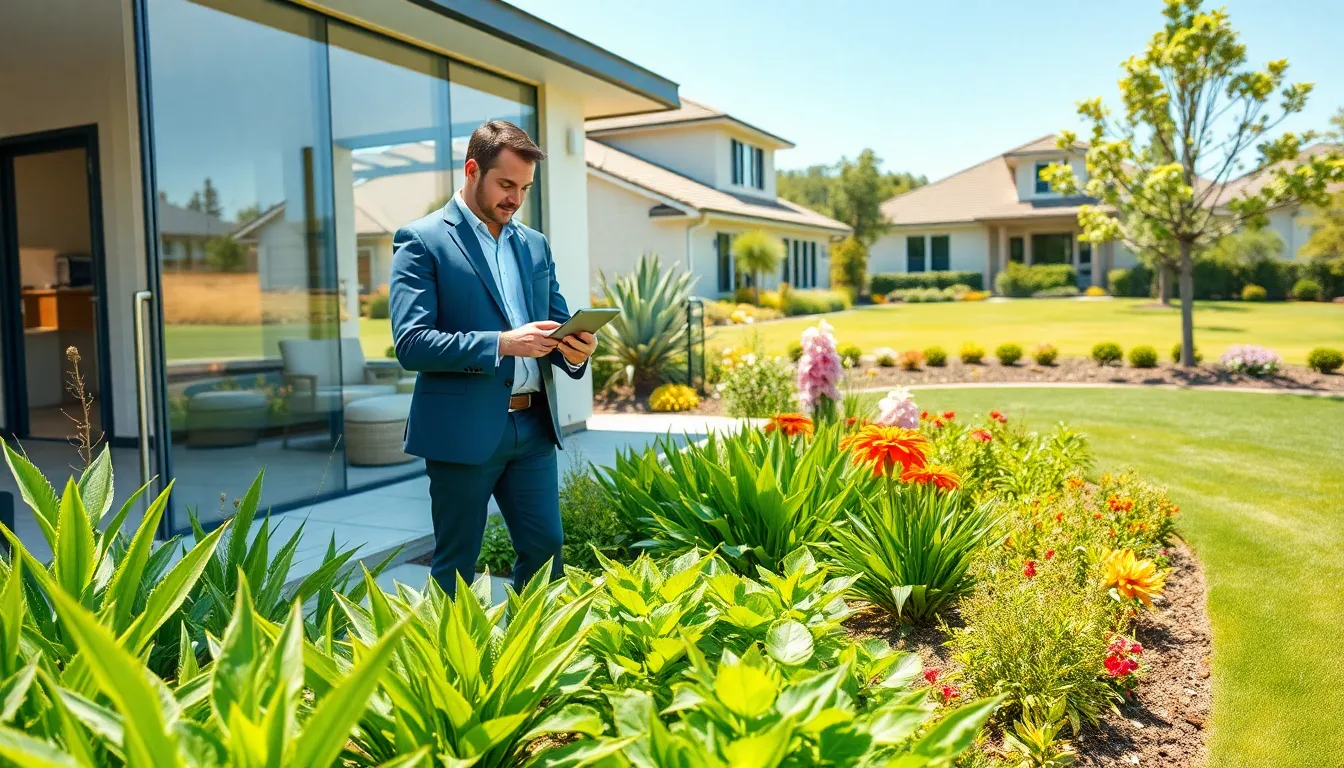Table of Contents
TogglePicture this: it’s a hot summer day, and you’ve just spotted a sprinkler system working harder than your neighbor who’s trying to keep his lawn green. If you believe manual watering is the way to go, it might be time for a refreshing perspective. The world of irrigation has entered the smart age, transforming how properties manage water consumption, and it’s high time real estate professionals caught up. Enter smart irrigation, where technology meets thirsty plants and saves the day. Let’s jump into how this innovative approach can revolutionize water usage in real estate, both for the environment and your wallet.
Understanding Smart Irrigation Technology

Smart irrigation technology blends sensors, weather data, and advanced programming to optimize watering schedules for landscapes. Traditional systems, those trusty old sprinklers, run regardless of weather conditions, leading to waste. Smart systems, but, use real-time data, adjusting water output based on current weather patterns and soil conditions. Imagine wards of sensors sprinkled throughout a property, collecting data on moisture levels and plant health. When the sun shines bright and the ground is dry, the system kicks into action. But if a gentle rain falls? The system sits back and relaxes. It’s like having a personal watering assistant that knows when to step in and when to chill. This smart technology doesn’t just save water: it enhances the lifecycle of plants, making gardens thrive with less effort.
Also, these systems can be operated remotely using mobile apps, allowing property managers to keep their gardens hydrated even while sipping coffee on the beach. Device connectivity can include decision-making algorithms that minimize water usage while maintaining lush landscapes. In short, smart irrigation makes a strong case for future-proofing real estate water management.
Benefits of Smart Irrigation for Property Owners
The adoption of smart irrigation technology isn’t just a trend: it’s proving to be a game-changer for property owners everywhere. For starters, let’s talk savings. By using data-driven irrigation systems, owners can significantly cut down on their water bills, no more paying for water that’s wasted on excessive watering or improper scheduling. This technology streamlines operations, leading to more efficient resource use.
Also, smart irrigation enhances property value. Prospective buyers are increasingly seeking out homes that feature sustainable practices, including efficient water management. It’s not just about aesthetics: it’s about investing in the future. Properties equipped with smart irrigation systems demonstrate responsible stewardship of resources, which is a huge plus in an environmentally conscious market.
Besides, less time spent managing irrigation translates to more time for property owners to focus on other areas. Who wouldn’t want that freed-up time? The average homeowner or property manager can spend hours adjusting sprinklers and checking on plants. Smart systems mean less hassle and more results. They allow owners to attend to other pressing matters, like picking paint colors for the property or deciding which side of the house gets the new trampoline.
Key Features of Smart Irrigation Systems
Smart irrigation systems flaunt a variety of features that elevate them above traditional methods. First up is weather integration. With advanced systems connected to local weather forecasts, users receive real-time updates that influence watering schedules. This means rain can automatically pause the sprinklers.
Soil moisture sensors are another vital feature. These clever devices monitor the moisture in the earth, adjusting watering levels accordingly. If the soil feels moisture rich, sprinklers can take a vacation. Latest smart controllers even use historical data and advanced algorithms to predict the watering needs of plants.
Besides, most smart irrigation systems can be programmed via smartphone applications, allowing easy access and adjustment from anywhere. This is particularly handy for remote property owners or those who manage multiple locations.
Finally, some systems include alerts and notifications about any issues. If a leak occurs or a malfunction is detected, the user gets an immediate heads-up to address the problem, preventing further damage and wasted resources. With all these features in place, it’s hard to argue against investing in a smart irrigation system for any property.
Implementing Smart Irrigation in Real Estate Development
Integrating smart irrigation during real estate development can have profound implications for both cost efficiency and environmental sustainability. To begin with, it’s essential to assess the landscape and climate of the area. Some regions may require less water than others based on natural precipitation patterns. This understanding can influence the types of plants chosen for the development as well as appropriate irrigation strategies.
Next, choosing the right type of system is crucial. The decision must align with the scale of the project. Are you managing a sprawling golf course or a cozy suburban subdivision? The larger the area, the more advanced the system should be. It should feature multiple zones with varying moisture needs.
During the construction phase, installation teams should carefully strategize the placement of sensors and irrigation lines for maximum effectiveness. Once the system is in place, proper training for property managers can ensure everything runs smoothly. Ongoing maintenance is necessary to keep the system functioning at its best. Regular checks for sensor accuracy and software updates are essential to maintaining optimal performance.
Integrating Smart Irrigation with Sustainable Practices
Sustainable practices in real estate development go hand in hand with smart irrigation technologies. When smart irrigation systems are implemented as part of a broader sustainability plan, they enhance the overall efficiency of a property. For instance, coupling smart systems with drought-resistant landscaping can significantly reduce water usage. This aligns well with sustainability goals and makes properties more resilient to climate variability.
Also, education plays a key role in promoting sustainability. Engaging occupants about water-saving practices empowers them to contribute to the solution. Educational programs can be introduced to inform residents about how the system works and how they can optimize watering schedules based on their landscaping.
Plus, using recycled water for irrigation can make a significant impact. Many smart systems can manage water sources, ensuring that recycled water is used effectively. Implementing such practices can lead to significant reductions in fresh water demand while raising property values simultaneously. Properties that boast sustainable practices alongside smart water management catch the eye of conscientious buyers in today’s market.
Future Trends in Smart Irrigation for Realty
Looking ahead, the future of smart irrigation in real estate promises even greater evolution and potential. As technology continues to advance, we can expect smarter integration with landscape design. This means more personalized watering schedules based on specific plant needs, improving overall plant health and reducing waste.
Innovative AI and machine learning capabilities will also play a significant role. Systems could learn from past watering behaviors and weather patterns, constantly refining their effectiveness. Imagine a smart irrigation system that could predict a heatwave weeks in advance and adjust accordingly.
Also, developments in IoT, Internet of Things, will ensure greater connectivity between different smart systems within a property, from irrigation to lighting and energy management systems. These integrated systems will create a more comprehensive understanding of resource needs, making properties more self-sustaining and efficient.
Finally, regulatory frameworks focusing on water conservation will likely fuel more widespread adoption of smart irrigation technology. Governments are increasingly incentivizing sustainable practices, making it easier for property owners to invest in smart systems. With these trends on the horizon, the future for smart irrigation systems in real estate looks bright.







